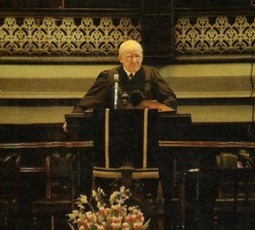It can be put like this: Why am I, or why is anyone else, a preacher of the Gospel? There is only one answer to that question. I am a preacher because I believe I have been called; because in my little way God has given me a burden; because I know by personal experience, by the experience of others, and by experience garnered from the reading of history that there is nothing under heaven that can enable men and women to conquer and to master life and to have a hope that cannot be dimmed except this Gospel. Therefore, the most urgent task in the world today is to make the Gospel known to men and women. And this is the function of the Christian church.
But as we all know, the great tragedy is that there is utter confusion with regard to what the Gospel is, what the church is, and what Christians are supposed to do. I call your attention to this, God knows, not because I am anxious to be controversial but because I have a burden for the souls of men and women. I would not be a preacher were it not for that. That is what originally put me in the ministry and makes me go on. I see the confusion. I see men and women bewildered, asking, “What is Christianity? What is the church?” And I am not surprised that they are bewildered.
Furthermore, this confusion is not confined to men and women outside the church. Indeed, I have an increasing fear that the confusion of those outside has been produced mainly by the so-called Christian church herself. A man who has held the highest position in one of the religious denominations and is well-known as one who speaks in the name of Christianity has recently said that he thinks certain things should be done at once, and the first is that the church must give up the foolish habit of having two services on a Sunday. “One is enough,” he says, “and let’s have it at nine o’clock in the morning so that having got that out of the way, we can then give ourselves to what we want to do.” He also says that if he had the power, he would decree that there should be no reading of the Bible at all for twelve months—this in the name of the church and of Christianity! And then he says that any preaching that is done in the one and only service at nine o’clock in the morning should, for at least a year, be on a political text alone.
I call attention to this because it is so typical of what is being said at the present time. Is it surprising that men and women are in a state of confusion? Speaking generally, the current idea is that the Christian message is, after all, nothing but a kind of teaching with regard to how our affairs should be ordered—that is why it is held that all texts should be political. It is said that the main business of the church is to deal with injustices and to do the work of reform and that in the Sermon on the Mount we have a kind of social charter. People who say this are never interested in the Old Testament; they generally dismiss it in toto, and they have no use for the apostle Paul. Instead, they point to the ethical teaching of Jesus. “There’s your political program,” they say. “There’s your political charter, and all you must do is apply it as best you can. You must not even read the Bible, but pick up these general principles, and try to put them into practice.”
Others say that Christianity is mainly an elevated, optimistic view of life, a sort of philosophy. Having found out how life can be lived on a higher plane and having experienced a moral uplift, you try to get others to adopt these principles.
And then there are others who, perhaps nearer to the Christian position, regard Christianity as being mainly a matter of morals and of conduct. They say that what makes people Christians is that they have adopted this ethical teaching and put it into practice. So by living a good life, they have made themselves Christians (emphasis mine).*Soli Deo Gloria!
*Lloyd-Jones, D. M. (2000). Authentic Christianity (1st U.S. ed.) (6–7). Wheaton, Ill.: Crossway Books.



